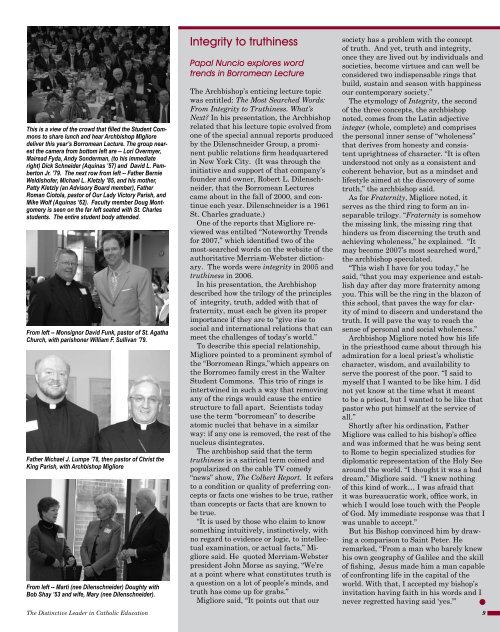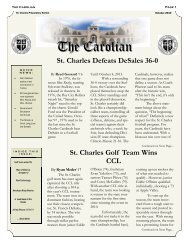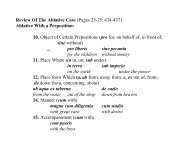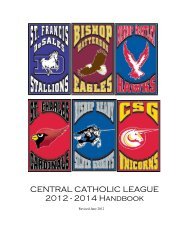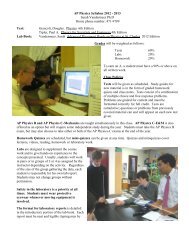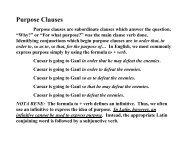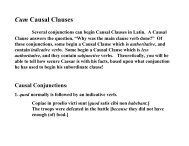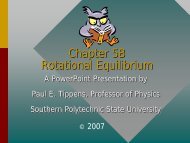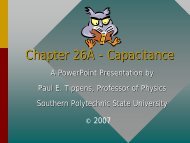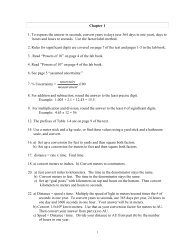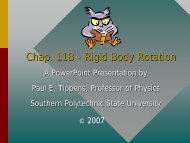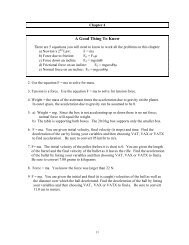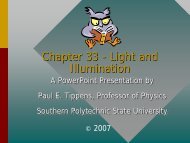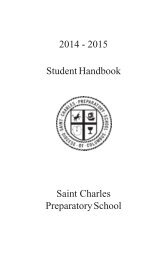New Turf Field Awaits Cardinals - St. Charles Preparatory School
New Turf Field Awaits Cardinals - St. Charles Preparatory School
New Turf Field Awaits Cardinals - St. Charles Preparatory School
Create successful ePaper yourself
Turn your PDF publications into a flip-book with our unique Google optimized e-Paper software.
This is a view of the crowd that filled the <strong>St</strong>udent Commons<br />
to share lunch and hear Archbishop Migliore<br />
deliver this year’s Borromean Lecture. The group nearest<br />
the camera from bottom left are -- Lori Overmyer,<br />
Mairead Fyda, Andy Sonderman, (to his immediate<br />
right) Dick Schneider (Aquinas ’57) and David L. Pemberton<br />
Jr. ’79. The next row from left -- Father Bernie<br />
Weldishofer, Michael L. Kletzly ’85, and his mother,<br />
Patty Kletzly (an Advisory Board member), Father<br />
Roman Ciotola, pastor of Our Lady Victory Parish, and<br />
Mike Wolf (Aquinas ’62). Faculty member Doug Montgomery<br />
is seen on the far left seated with <strong>St</strong>. <strong>Charles</strong><br />
students. The entire student body attended.<br />
From left -- Monsignor David Funk, pastor of <strong>St</strong>. Agatha<br />
Church, with parishoner William F. Sullivan ’79.<br />
Father Michael J. Lumpe ’78, then pastor of Christ the<br />
King Parish, with Archbishop Migliore<br />
From left -- Marti (nee Dilenschneider) Doughty with<br />
Bob Shay ’53 and wife, Mary (nee Dilenschneider).<br />
The Distinctive Leader in Catholic Education<br />
Integrity to truthiness<br />
Papal Nuncio explores word<br />
trends in Borromean Lecture<br />
The Archbishop’s enticing lecture topic<br />
was entitled: The Most Searched Words:<br />
From Integrity to Truthiness. What’s<br />
Next? In his presentation, the Archbishop<br />
related that his lecture topic evolved from<br />
one of the special annual reports produced<br />
by the Dilenschneider Group, a prominent<br />
public relations firm headquartered<br />
in <strong>New</strong> York City. (It was through the<br />
initiative and support of that company’s<br />
founder and owner, Robert L. Dilenschneider,<br />
that the Borromean Lectures<br />
came about in the fall of 2000, and continue<br />
each year. Dilenschneider is a 1961<br />
<strong>St</strong>. <strong>Charles</strong> graduate.)<br />
One of the reports that Migliore reviewed<br />
was entilted “Noteworthy Trends<br />
for 2007,” which identified two of the<br />
most-searched words on the website of the<br />
authoritative Merriam-Webster dictionary.<br />
The words were integrity in 2005 and<br />
truthiness in 2006.<br />
In his presentation, the Archbishop<br />
described how the trilogy of the principles<br />
of integrity, truth, added with that of<br />
fraternity, must each be given its proper<br />
importance if they are to “give rise to<br />
social and international relations that can<br />
meet the challenges of today’s world.”<br />
To describe this special relationship,<br />
Migliore pointed to a prominent symbol of<br />
the “Borromean Rings,”which appears on<br />
the Borromeo family crest in the Walter<br />
<strong>St</strong>udent Commons. This trio of rings is<br />
intertwined in such a way that removing<br />
any of the rings would cause the entire<br />
structure to fall apart. Scientists today<br />
use the term “borromean” to describe<br />
atomic nuclei that behave in a similar<br />
way: if any one is removed, the rest of the<br />
nucleus disintegrates.<br />
The archbishop said that the term<br />
truthiness is a satirical term coined and<br />
popularized on the cable TV comedy<br />
“news” show, The Colbert Report. It refers<br />
to a condition or quality of preferring concepts<br />
or facts one wishes to be true, rather<br />
than concepts or facts that are known to<br />
be true.<br />
“It is used by those who claim to know<br />
something intuitively, instinctively, with<br />
no regard to evidence or logic, to intellectual<br />
examination, or actual facts,” Migliore<br />
said. He quoted Merriam-Webster<br />
president John Morse as saying, “We’re<br />
at a point where what constitutes truth is<br />
a question on a lot of people’s minds, and<br />
truth has come up for grabs.”<br />
Migliore said, “It points out that our<br />
society has a problem with the concept<br />
of truth. And yet, truth and integrity,<br />
once they are lived out by individuals and<br />
societies, become virtues and can well be<br />
considered two indispensable rings that<br />
build, sustain and season with happiness<br />
our contemporary society.”<br />
The etymology of Integrity, the second<br />
of the three concepts, the archbishop<br />
noted, comes from the Latin adjective<br />
integer (whole, complete) and comprises<br />
the personal inner sense of “wholeness”<br />
that derives from honesty and consistent<br />
uprightness of character. “It is often<br />
understood not only as a consistent and<br />
coherent behavior, but as a mindset and<br />
lifestyle aimed at the discovery of some<br />
truth,” the archbishop said.<br />
As for Fraternity, Migliore noted, it<br />
serves as the third ring to form an inseparable<br />
trilogy. “Fraternity is somehow<br />
the missing link, the missing ring that<br />
hinders us from discerning the truth and<br />
achieving wholeness,” he explained. “It<br />
may become 2007’s most searched word,”<br />
the archbishop speculated.<br />
“This wish I have for you today,” he<br />
said, “that you may experience and establish<br />
day after day more fraternity among<br />
you. This will be the ring in the blazon of<br />
this school, that paves the way for clarity<br />
of mind to discern and understand the<br />
truth. It will pave the way to reach the<br />
sense of personal and social wholeness.”<br />
Archbishop Migliore noted how his life<br />
in the priesthood came about through his<br />
admiration for a local priest’s wholistic<br />
character, wisdom, and availability to<br />
serve the poorest of the poor. “I said to<br />
myself that I wanted to be like him. I did<br />
not yet know at the time what it meant<br />
to be a priest, but I wanted to be like that<br />
pastor who put himself at the service of<br />
all.”<br />
Shortly after his ordination, Father<br />
Migliore was called to his bishop’s office<br />
and was informed that he was being sent<br />
to Rome to begin specialized studies for<br />
diplomatic representation of the Holy See<br />
around the world. “I thought it was a bad<br />
dream,” Migliore said. “I knew nothing<br />
of this kind of work… I was afraid that<br />
it was bureaucratic work, office work, in<br />
which I would lose touch with the People<br />
of God. My immediate response was that I<br />
was unable to accept.”<br />
But his Bishop convinced him by drawing<br />
a comparison to Saint Peter. He<br />
remarked, “From a man who barely knew<br />
his own geography of Galilee and the skill<br />
of fishing, Jesus made him a man capable<br />
of confronting life in the capital of the<br />
world. With that, I accepted my bishop’s<br />
invitation having faith in his words and I<br />
never regretted having said ‘yes.’”


